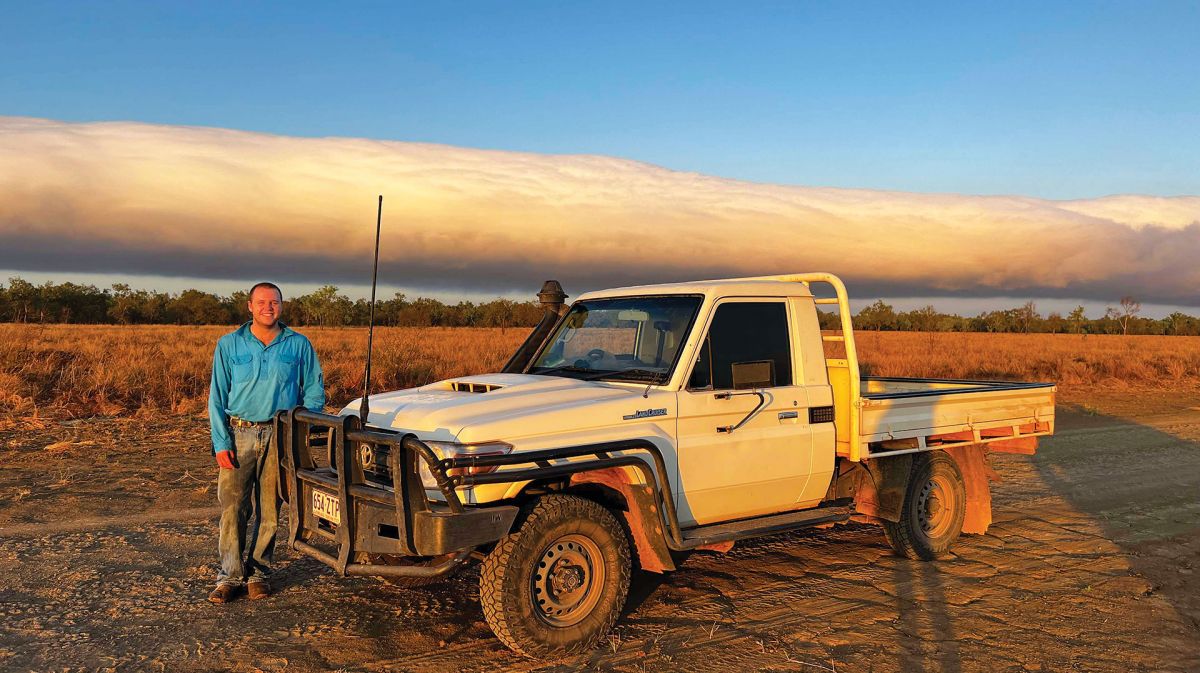Scholarship gives future agricultural professionals a head start

AgriFutures 2022-23 Horizon Scholar Hugo Quinn heads off to check stock watering points at Escott Station in far north Queensland. Photo: Supplied
Tomorrow’s growers, scientists, researchers, agronomists, agricultural professionals and leaders are getting a head start in their careers thanks to a unique scholarship program.
The AgriFutures Horizon Scholarship program, launched in 2010, is aimed at university students in their final years of study in agriculture, STEM or related fields.
Sponsors such as GRDC provide a $10,000 bursary over two years, along with $3000 per year for industry placements to prepare students for careers in agriculture.
These investments yield tangible benefits for the grains industry. Scholars often pursue careers directly tied to their placements or areas of study, bringing fresh perspectives and skills to the sector.
Professional development workshops
As much as the cash helps ease the financial burden of tertiary study, 2022-23 Horizon Scholar Emily Chambers says the professional development workshops and placements were the most valuable for her.

AgriFutures 2022-23 Horizon Scholar Emily Chambers. Photo: Supplied
Emily, who graduated from the University of Adelaide with a Bachelor of Agricultural Science, says the workshops helped her better identify her professional goals and skills, as well as allowing her to meet an inspiring group of young people across the agricultural sector.
“They were my age but had done amazing things in their local communities and abroad that I thought were too far out of reach,” she says.
“It encouraged me to keep exploring new opportunities and getting different experiences, which was helpful.”
Emily completed one placement with Pinion Advisory in South Australia. She now works full-time for Pinion as a graduate agribusiness consultant, focusing on agronomy.
“I loved how the consultants at Pinion Advisory used data and economics to guide growers through the decision-making process with a business mindset,” she says.
“I enjoyed combining the science and the business side, all while working in a very people-oriented role.”
Emily’s second placement with Riverina Local Land Services in Wagga Wagga provided exposure to government agency operations. It highlighted her preference for grower-focused consultancy work.
“My goal is to keep working with farmers to help them make the most-informed decisions that they can based on the current science and what makes sense for their business,” she says.
“And, hopefully, setting them up for the future to be in a good place to maintain market access and profitability and to keep ahead of what changes are happening in the industry.”
Transformative opportunities
The program opened unexpected doors for Hugo Quinn, another 2022-23 scholar, who studied a Bachelor of Agribusiness at Curtin University, in Perth.

Hugo Quinn, another AgriFutures 2022-23 Horizon Scholar. Photo: Supplied
Initially,
Hugo was keen to work in extension agronomy, planning and managing
field trials, but meeting the other 20 scholars opened his eyes to other
options.
Hugo’s first placement was with Yorke Peninsula grain producer Sheoak Hill Farms, where he was introduced to lentils “which I’d never seen before”.
He then used placement funds to work in California at Hunewill Guest Ranch, a working cattle and tourism venture operating across 10,500ha on the eastern slopes of the Sierra Nevada Mountains.
“That turned things on their head for me. I’d never seen or done anything with cattle before,” he says.
Last year, Hugo worked at Escott Station near Burketown in far north Queensland, and with a contract grain harvesting team along the east coast, before a stint on a cropping farm in Victoria.
“The scholarship has changed my life in a lot of different ways,” he says.
Investing in the future
The Horizon Scholarship program’s emphasis on learning, networking and real-world exposure ensures scholars are well-equipped to contribute meaningfully to their chosen fields.
GRDC capacity and extension manager Katelyn Lubcke says the program has been designed to make it easier for students to navigate career pathways in agriculture by building connections and skills that are valuable early in their careers.
“With the scholarship, they are supported to think differently ... and outside the box with their placements. The program encourages them to have big experiences, so they can bring diverse skills and different thinking to the grains industry,” she says.
Each year the scholars are brought together for a week-long stakeholder summit where they workshop solutions to existing challenges in agriculture, network with industry leaders and build confidence in public speaking.
“This is a big bonus for them, which they all mention in their reports, being able to connect with their cohort face to face,” says Emily Jones, AgriFutures acting manager capacity building.
“That public speaking aspect is really important because a big part of the scholarship is giving these scholars a platform – a voice – so they need to know how to use it.”
Many scholars have gone on to speak at conferences, join panels and attend events such as GRDC Updates, evokeAG and the Australian Women in Agriculture conference.
Almost 60 students have been awarded GRDC-invested scholarships under the program since it began in 2010, with another four to be announced in April.
Applications for the next intake open in November.
This article appeared in GroundCover
